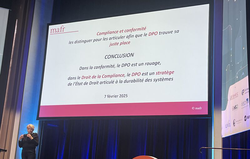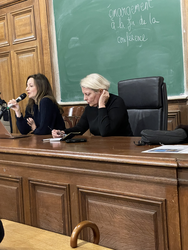The recent news
Feb. 7, 2025
Conferences

🌐suivre Marie-Anne Frison-Roche sur LinkedIn
🌐s'abonner à la Newsletter MAFR Regulation, Compliance, Law
🌐s'abonner à la Newsletter en vidéo MAFR Surplomb/Overhang
____
► Full Reference: M.-A. Frison-Roche, "Compliance" et "conformité" : les distinguer/mieux les articuler afin que le DPO trouve sa juste place" ("Compliance Law" and "conformity" : distinguish between them/better articulate them so that the DPO finds their rightful place"), , in Association française des correspondants à la protection des données à caractère personnel (AFCDP), 19ème Université AFCDP des DPO - La gouvernance des données ("Data Governance"), Maison de la Chimie, Paris, 7 February 2025 , 10h-10h45.
____
🧮 see this manifestation full program (in French)
____
⬜ see les slides on which this conference is done (in French)
____
► English Presentation of this conference: 'Compliance' and 'conformité' are often considered to be synonymous, notably in French in which the term "Compliance" is so often used to express only the "conformity" (conformité). This is a misunderstanding and a reduction, particularly of the role of professionals, notably DPOs. In fact, 'conformity' consists solely of ensuring that regulations are respected. Of course, an"active" conformity and "proven" conformity with these regulations, in particular the European GDPR. That and only that.
If that's the case, then on the one hand this task impossible, because no one can comply with all the regulations, and it's the obsession with avoiding or reducing penalties that actually replaces the desire to do the right thing. On the other hand, algorithms are going to replace the DPO, a human being, because algorithms will identify 'non-conformity', then conformity, then write it down by "smart" contracts.
But Compliance Law is more than conformity, which is only one of its tools. Compliance Law aim is to protect the human beings involved in the systems. Data protection is one of the best examples of this, and it underpins all the other areas of Compliance Law. Companies are asked to do less (obligation of means) and more: to help protect, by distinguishing between what must be revealed and what must be kept secret, sometimes to resolve conflicts between the 2 prescriptions, to educate, to make alliances.
To built a real "governance". In this human and humanist mission that anchors Europe, the algorithm is flat. We are waiting for the DPO. In this human and humanist mission that anchors Europe, the algorithm is flat. We are waiting for the DPO. There is the role of guardian of the spirit of the texts, of strategic aid for the data controller, of adjuster of complementary or contradictory subjective rights, of adjustment of the texts in the European puzzle of a Regulatory Europe, which is being put in place in the humanist tradition which is its own to preserve the durability of the systems to protect the people who are forcibly or voluntarily involved in them.
________

Feb. 5, 2025
Publications

🌐follow Marie-Anne Frison-Roche sur LinkedIn
🌐subscribe to the Newsletter MAFR Regulation, Compliance, Law
🌐subscribe to the Video Newsletter MAFR Surplomb
____
 ► Full Reference: M.-A. Frison-Roche, Who is responsible for making the Compliance provision effective? Is it the company or the public authority? Example of data: CE, 27 January 2025, B. c/ CNIL, Working Paper, February 2025.
► Full Reference: M.-A. Frison-Roche, Who is responsible for making the Compliance provision effective? Is it the company or the public authority? Example of data: CE, 27 January 2025, B. c/ CNIL, Working Paper, February 2025.
____
🎤 This Working Paper was developed as a basis for the Overhang👁 video on 8 February 2025 : click HERE (in French)
____
🎬🎬🎬In the collection of the Overhangs👁 It falls into the News category.
►Watch the complete collection of the Overhangs👁 : click HERE
____
► Summary of this Working Paper: In its decision of 27 January 2025, B. v CNIL, the French Administrative Supreme Court (Conseil d'État ) had to provide a solution to a case that the Compliance rules applicable to data had not expressly provided for. Can a person who believes that another person has failed to fulfill their obligations under the GDPR refer the matter to the French Data Protection Regulator (CNIL) and not the data controller?
The Conseil d'État considers that the question is clear and that there is no point in referring a preliminary question to the ECJ. Indeed, the texts require the person alleging that his or her right has been infringed to first contact the data controller to have the information deleted before subsequently referring the matter to the CNIL. Furthermore, this case involved personal information inserted by doctors in an expert report submitted to a court. The Conseil d'Etat agreed with the CNIL that it was not required to review and assess the evidence, which is the role of the court.
This shows that, while the right to alert can be used to refer cases directly to the administrative authorities, here the specific takes precedence over the general, with the spirit of the Law entrusting the direct preservation of rights to the data controller, with the CNIL's supervisory and sanctioning role coming only at a later stage. This illustrates the more general nature of Compliance Law, which relies primarily on the operators themselves. Furthermore, as a melting pot of various subjective rights, in this case the right to erasure but also the right to contribute to the debates, the Conseil d'Etat stresses that it is the role of the judicial judge to ensure the fairness of the debates.
____
🔓read the developments below⤵️
Jan. 28, 2025
Conferences

🌐suivre Marie-Anne Frison-Roche sur LinkedIn
🌐s'abonner à la Newsletter MAFR. Regulation, Compliance, Law
🌐s'abonner à la Newsletter Surplomb, par MAFR
____
► Référence complète : M.-A. Frison-Roche, "Juger une situation familiale, une "obligation impossible"", in Collège de Droit de l'Université Panthéon-Sorbonne (Paris I), Dialogue avec Éliette Abécassis autour de son roman Divorce à la française, Amphi Turgot, Sorbonne, 28 janvier 2025, 20h-21h30, Paris.
____
🪑🪑🪑Cette conférence a été ouverte par Philippe Stoffel-Munck, co-directeur du Collège de Droit de l'Université Panthéon-Sorbonne (Paris I), qui a présenté les parcours, travaux et personnalités d'Éliette Abécassis et de moi-même.
Puis, selon le principe du dialogue, Éliette Abécassis a présenté trois points d'un point de vue littéraire et philosophique sur lesquels elle m'a demandé d'exprimer ma perspective.
- Le premier point portait sur la procédure, les caractères contradictoires des discours des uns et des autres, la place de la vérité dans une procédure de divorce et la place de la vérité.
- Le deuxième point a porté sur la difficulté de juger, sur l'impossibilité même de juger, son roman étant construit pour mettre le lecteur dans la position qui est celle du juger : comment arriver à juger ?
- Le troisième point a porté sur le caractère "profondément humain" des divorces et du jugement de ceux-ci et, en conséquence, de ce qui donnerait l'application de ladite intelligence artificielle en la matière.
Selon la méthode convenue entre nous, n'ayant pas été prévenue du choix de ces perspectives-là mais connaissant bien Éliette Abécassis et son oeuvre, j'ai donc développé "sur le banc" les points suivants pour les articuler à l'auditoire composé d'étudiants en droit en 1ière, 2ième et 3ième année :
____
► Présentation de mes réponses aux questions ouvertes par Eliette Abécassis dans ce dialogue : 🔴Éliette a montré comment dans Divorce à la français, elle a fait parlé de multiples personnes impliquées dans la procédure de divorce qui font des récits contradictoires, proposant des vérités qui se contredisent, reprenant comme trame du roman la procédure elle-même. Les vérités multiples sont ainsi confrontées, notamment celle de la littérature et celle du Droit.
I. LE PRINCIPE DU CONTRADICTOIRE, LA VÉRITÉ, LES PARTIES ET LE JUGE
La procédure est effectivement gouvernée par le "principe du contradictoire". Pour les parties au litige, il ne s'agit pas particulièrement de participer à la recherche de la vérité : une partie dans un procès veut gagner, c'est-à-dire notamment que son adversaire perde. Le débat et son alimentation notamment en éléments de preuve a pour bénéficiaire principe le juge. D'ailleurs et à ce titre le principe du contradictoire se démarque des droits de la défense, en ce que ceux-ci n'ont pas toujours pour objectif la vérité mais sont des prérogatives, de plus haut niveau dont les personnes sont titulaires parce qu'elles sont en risque dans la perspective de la décision susceptible d'être prise. Elles peuvent ainsi se défendre, par exemple en mentant, ou en se taisant. Les autorités sont donc davantage favorables au contradictoire, principe qui fonctionne en leur faveur, qu'aux droits de la défense, droits subjectifs qui leur sont parfois opposées. Parce que le juge est gardien de l'État de droit, il concrétise le contradictoire mais aussi les droits de la défense. Parce que la vérité peut aussi être un argument, elle peut aussi alimenter défense et débat mais gardons en tête cette opposition de départ qui fonde le Droit processuel, que Divorce à la française illustre.
🔴Le deuxième point est sur la difficulté de juger. Éliette Abécassis souligne la difficulté de juger qui est d'autant plus pointée dans son roman que le juge est à la fois omniprésent qu'il est le seul à ne pas prendre la parole. C'est donc le lecteur qui est institué juge. Il perçoit lui-même à travers son expérience de lecteur la difficulté de juger, mais aussi l'importance de juger. Elle se réfère notamment notamment aux travaux de Paul Ricoeur sur l'enjeu du jugement et du juste.
II. LE DIFFICILE ART DE JUGER, OBLIGATION IMPOSSIBLE
Cela m'a fait penser à l'ouvrage publié avec un ami très cher qui étudia avec moi dans ce même Amphi Turgot la philosophie pour une licence de philosophie, ouvrage ayant pour titre La justice. L'obligation impossible. Il est "impossible" de juger, parce qu'il est "impossible" d'être juste.
Faut-il donc se détourner de cet office-là ? De cette prétention-là ? Non, car si la justice, comme la vérité, est un point que nul ne peut atteindre, alors que la Justice est une vertu qui contient toutes les autres et en cela si nous ne sommes pas justes nous n'avons plus aucune vertu (par exemple la vertu du courage), il convient (comme le fait tout juge) partir des situations.
Les situations sont injustes. Etre juste, c'est d'abord être sensible, être perspicace à l'intensité d'injustice de telle ou telle situation. C'est déjà ça. Puis, c'est agir. C'est-à-dire la dire, ce qui est déjà un premier jugement. Puis la trancher, la réparer, la consoler. C'est ainsi que l'on peut être juste. C'est sans doute pour cela que l'on devient juge. Notamment lorsqu'il s'agit des situations familiales.
🔴Éliette insiste sur la violence des conflits qui s'exprime aussi dans les procédures de divorce et que son roman met en scène. Cette instabilité des rapports humains correspond à une société qui est en train de "liquéfier" les rapports entres les êtres humains, et bientôt les êtres humains eux-mêmes. Elle s'inquiète de ce que va produire sur la justice humaine l'usage de l'intelligence artificielle.
III. LES ALGORITHMES, APPUI OU DESTRUCTION DE L'OFFICE DU JUGE
Le troisième point porte donc sur la pertinence, légitimité et efficacité de l'usage des algorithmes dans les contentieux de divorce. Il est tentant de répondre en bloc que le système algorithmique sans âme ne doit pas toucher ce contentieux-là car pour reprendre les mots d'Eliette Abécassis, il est "profondément humain" et donc seul un juge humain peut y toucher. Mais il faut aussi considérer que la procédure, dont on a montré tout à l'heure la dimension humaniste à travers le contradictoire et les droits de la défense, est une machinerie, avec des délais et des séries d'actes de procédure que des algorithmes aident à mener et à contrôler.
La procédure c'est par nature du temps, et plus exactement de la durée, du temps qui passe. Il faut que la dispute ait le temps de s'apaiser. Faire durer peut aussi l'exacerber. Les outils algorithmiques peuvent permettre aux parties de se libérer, d'en finir. Il ne s'agit pas seulement d'une logique de gestion de flux vue du côté de l'institution mais aussi de justice pour les parties en litige qui peuvent en être libérées grâce à ces outils-là. Temps utile, délai raisonnable, sont aussi des garanties de procédure.
L'enjeu est alors d'avoir du discernement sur deux discernements. En premier lieu en distinguant ce qui relève de l'intendance procédurale que le système algorithmique et ce qui relève du choix qui doit être laissé au juge et aux parties. En second lieu, en distinguant ce qui dans les différents cas est identique malgré la singularité (définition de ce qu'est l'analogie) et se prêtent donc à la puissance algorithmique et qui n'est pas analogue. L'analogie est l'art même du juriste.
_____

Jan. 25, 2025
Publications

🌐follow Marie-Anne Frison-Roche sur LinkedIn
🌐subscribe to the Newsletter MAFR Regulation, Compliance, Law
🌐subscribe to the Video Newsletter MAFR Surplomb
____
 ► Full Reference: M.-A. Frison-Roche, The French Judicial Public Interest Agreement and the time saved: the Areva and Orano CJIP of 2 December 2024, Working Paper, January 2025.
► Full Reference: M.-A. Frison-Roche, The French Judicial Public Interest Agreement and the time saved: the Areva and Orano CJIP of 2 December 2024, Working Paper, January 2025.
____
🎤 This Working Paper was developed as a basis for the Overhang👁 video on 25 January 2025 : click HERE (in French)
____
🎬🎬🎬In the collection of the Overhangs👁 It falls into the News category.
►Watch the complete collection of the Overhangs👁 : click HERE
____
► Summary of this Working Paper: On 2 December 2024, Areva/Orano signed a Public Interest Judicial Agreement (CJIP) with the French National Financial Prosecutor's Office, validated by the order of 9 December 2024 of the President of the Paris Judicial Court. The case concerns the bribery of a foreign public official in Mongolia through the use of an intermediary.
This perfectly illustrates the primary advantage of this Compliance Tool, which consists of closing a situation that could deprive a company of the means to act in the future. Even if neither the CJIP nor the validation order constitutes an admission of guilt or a conviction, the acts of bribery of a foreign public official can no longer give rise to prosecution.
However, the future has been taken care of, because as soon as Tracfin passed the first information to the Public Prosecutor's Office, the company cooperated and set up a programme to actively fight corruption ("compliance programme"). The CJIP extends this by a compliance programme supervised by the French Anticorruption Agency.
One month after the CJIP, the Mongolian government and the company, in the presence of the French government, announced on 17 January 2025 the signing of a contract to operate a uranium mine, the same industrial coopération that had given rise to these reprehensible acts. The CJIP made it possible to move forward in time.
____
🔓read the developments below⤵️
Jan. 23, 2025
Interviews

🌐suivre Marie-Anne Frison-Roche sur LinkedIn
🌐s'abonner à la Newsletter MAFR Regulation, Compliance, Law
🌐s'abonner à la Newsletter en vidéo MAFR Surplomb
____
► Full Reference: M.-A. Frison-Roche, « La compliance est avant tout une affaire humaine» (Compliance is first and foremost a human issue), interview conducted by Olivia Dufour for Actu-juridique, Lextenso, 23 January 2025.
___
► read the interview: 💬in French)
____
🏛️🏛️🏛️🏛️this interview was organised following a number of official opening hearings of Parisian courts, in particular that of the Paris Judicial Court on 21 January 2025, at which the presidents of these courts explained the role now played by systemic litigation and compliance and/or vigilance law, in particular in the internal organisation of their courts.
____
► presentation of this interview:
Q. (translated): At the start of the new session of the official opening hearings of Paris Court of First Instance on 21 January, President Stéphane Noël spoke at length about the creation of a 34th chamber dedicated to handling cases relating to companies' obligation of vigilance. What are the advantages of this new specialisation?
MAFR Answer Summary: It corresponds to the jurisdiction given to the Paris Court of First Instance by the French 2020 so-called Confidence Act, which extends the French 2017 so-called Vigilance Act. It reflects the importance of Compliance Law, of which Vigilance is the leading edge.
Q. (translated): The court president points out that this new litigation raises questions about the role of the courts, which is to "concilier le respect des buts fondamentaux pour la protection de l’humanité avec la possibilité pour les entreprises d’apprécier la maitrise des risques et leur éventuelle responsabilité" ("reconcile respect for the monumental goals of protecting humanity with the ability of companies to assess the control of risks and their potential liability"). What do you think?
MAFR Answer Summary: the role of the judge has been renewed, as they take charge of the future of the systems and participates in the achievement of the Monumental Goals of Compliance Law. Companies are subject by law to a new compliance obligation and must demonstrate their diligence. They may be held liable under the general ordinary legal regime, as set out in the French 2017 Act on Vigilance duty, if the claimant demonstrates the existence of fault or negligence, damage and a causal link between the 2.
Q. (translated): All this comes under the heading of compliance, a concept you've been working on for 10 years and which is still not fully understood and is too often confused with conformity....
MAFR Answer Summary: The 2 aforementioned concepts ("conformity" and "compliance") were identified in the article I published in 2016 entitled Le droit de la compliance"Compliance law". This notion has taken a long time to mature because, on the one hand, it is a radically new branch of law that has an impact on the other branches. On the other hand, indeed, there is confusion between 'compliance' and 'conformity'. Conformity is the obedience to applicable regulations; compliance is the active participation in the achievement of monumental goals to preserve or save systems in which humans are involved. Conformity is, and is only, a tool of Compliance Law.
Q. (translated): The Nanterre Court has just created a chamber for Emerging Systemic and Regulatory Litigation. Does this confirm the interest of the courts in this fundamental development?
MAFR Answer Summary: This statement by the President of the Nanterre Court of Appeal at his hearing on 20 January 2025 illustrates the Regulation - Compliance - Vigilance continuum. He involves training for judges and dialogue between judges. Training and dialogue are being put in place.
Q. (translated): Y a-t-il d’autres initiatives en ce sens ?
MAFR Answer Summary:Le président du Tribunal de commerce Paris à son audience du 15 janvier 2025 a annoncé la création d'une chambre des contentieux complexe. Les contentieux systémiques émergents, que le Droit de la Compliance peut engendrer, ont vocation à y être présentés. Là aussi, formation et dialogue se mettent en place.
Q. (translated): Que manque-t-il encore ?
MAFR Answer Summary: puisque le Droit de la compliance se contractualise de plus en plus, notamment dans les chaines de valeur concernées par les techniques de vigilance, l'arbitrage international est concerné. Des arbitres internationaux intégrant le droit de la compliance, et pas seulement attaché à telle et telle réglementation sectorielle, sont un enjeu d'attractivité de la Place de Paris. Cela va émerger, notamment par le dynamisme de la Cour internationale d'arbitrage, dont le siège est à Paris.
_________
Jan. 20, 2025
Conferences

🌐suivre Marie-Anne Frison-Roche sur LinkedIn
🌐s'abonner à la Newsletter MAFR. Regulation, Compliance, Law
🌐s'abonner à la Newsletter Surplomb, par MAFR
____
► Référence complète : M.-A. Frison-Roche, "Le feu des contentieux de divorce et le froid que le juge doit souffler,", in Association du Collège de Droit de l'Université Jean-Moulin Lyon 3, Rencontre et discussion autour du dernier roman de Eliette Abecassis : un divorce à la française. Manufacture des tabacs, 20 janvier 2025, 17h-19h, Lyon.
____
🪑🪑🪑🪑participent également à cette conférence-débat :
🕴️Eliette Abécassis, Ecrivain
🕴️Vincent Egéa, professeur à l'Université Aix-Marseille
🕴️Hervé de Gaudemar, professeur à l'Université Jean-Moulin Lyon 3
🕴️Jean-Christophe Roda, professeur à l'Université Jean-Moulin Lyon 3
____
► Présentation de mon intervention dans cette conférence-débat : Après avoir écouté la présentation par Vincent Egéa du livre d'Eliette Abécassis, Divorce à la française, publié par celle-ci chez Grasset, puis la description qu'Eliette Abécassis en a faite, dans son choix d'écrire sur cela, dans sa façon de l'écrire, la construction du roman, la distribution des paroles de chacun qui exprime son monde à lui, l'entrechoc de ces mondes et le juge devant lequel de plus en plus ces "vérités" sont racontés dans des rapports personnels et sociaux de plus en plus violents et liquéfiés,
avant qu'un débat ne s'instaure avec l'auditoire d'étudiants très nombreux,
j'ai repris dans ce livre à la fois si beau et si instructif qu'il permet au lecteur d'accéder à la réalité du Droit et de ce contentieux particulier du divorce.
Notamment en ce qu'il est désormais courant, et pour chacun singulier puisque chacun a son histoire et la défend avec flamme et stratégie. Cet enflammement, que les conseils ou la famille peut modérer mais bien souvent attisent, n'est pas propre au Droit de la famille. Même en Droit économique et financier, on trouve cela. Mais c'est bien dans les conflits du divorce que la passion se déchaine, la passion de la vérité pouvant particulier à cet emballement.
L'office du juge est alors de "modérer" cela, s'appuyant sur la froideur du Droit, froideur qu'on lui reproche souvent mais qui est aussi sa distance, son impartialité et qu'il peut à travers notamment le juge apporter pour remettre à une température modérée les rapports parentaux, pour éviter que l'enfant ne s'enflamme à son tour. C'est bien ce que le Législateur lui demanda en 1975. D'ailleurs son auteur, Carbonnier, demandait par ailleurs au Législateur d'être autour comme "étranger" à son objet pour ne pas se laisser aller à la "passion", contre laquelle il mit en garde notamment le juge en 1995.
En lisant ce roman qui nous institue juge et nous amène à manier nous-même le principe du contradictoire au fur et à mesure que, tournant les pages, l'on écoute l'un et l'autre, l'on comprend à quel point la littérature est une voie royale pour accéder à la compréhension du Droit, en ce qu'il traduit l'état d'une société.
_____
📝Lire le compte-rendu de cette conférence-débat
________

Jan. 18, 2025
Publications

🌐follow Marie-Anne Frison-Roche sur LinkedIn
🌐subscribe to the Newsletter MAFR Regulation, Compliance, Law
🌐subscribe to the Video Newsletter MAFR Surplomb
____
 ► Full Reference: M.-A. Frison-Roche, Status and Role of the 'trajectory' in Regulatory and Compliance Law, Working Paper, January 2025.
► Full Reference: M.-A. Frison-Roche, Status and Role of the 'trajectory' in Regulatory and Compliance Law, Working Paper, January 2025.
____
🎤 This Working Paper was developed as a basis for the Overhang👁 video on 18 January 2024 : click HERE (in French)
____
🎬🎬🎬In the collection of the Overhangs👁 It falls into the Notions category.
►Watch the complete collection of the Overhangs👁 : click HERE
____
► Summary of this Working Paper: The notion of Trajectory is a key concept in Compliance Law. This is shown in 4 steps.
- 1. the decisive use of the trajectory in the 3 Grande-Synthe decisions of the French Conseil d'Etat,
- 2. defining the trajectory,
- 3. the application of the trajectory in various sectoral Compliances and Compliance tools,
- 4. the probationary dimension of the trajectory and the consequences for subjected entities
____
🔓read the developments below⤵️

Jan. 11, 2025
Publications

🌐suivre Marie-Anne Frison-Roche sur LinkedIn
🌐s'abonner à la Newsletter MAFR Regulation, Compliance, Law
🌐s'abonner à la Newsletter en vidéo MAFR Surplomb
____
 ► Full Reference: M.-A. Frison-Roche, The puzzle of Institutional Compliance Law and Substantive Compliance Law: the example of the European Regulations of 31 May 2024 on AMLA and enterprises compliance obligations, Working Paper, January 2025.
► Full Reference: M.-A. Frison-Roche, The puzzle of Institutional Compliance Law and Substantive Compliance Law: the example of the European Regulations of 31 May 2024 on AMLA and enterprises compliance obligations, Working Paper, January 2025.
____
🎤 This Working Paper was developed as a basis for the Overhang👁 video on 11 January 2024 :
____
🎬🎬🎬In the collection of the Overhangs👁 It falls into the News category.
►Watch the complete collection of the Overhangs👁 : click HERE
____
► Summary of this Working Paper: Compliance Law is built on 2 legs, Institutions on the one hand and substantive rules on the other. For example in the United States, the 1934 Act established at the same time the prohibition and prevention of financial market abuse and the SEC. In Europe, in 2013, the Banking Union established institutions to build this Union and increased the obligations on banks.
This is perfectly illustrated by the 2 European Regulations of 31 May 2024, one creating the AMLA and the other reinforcing the compliance obligations of crucial economic operators, one text referring to the other.
Indeed, Institutional Compliance Law and Substantive Compliance Law are like 2 articulated legs. You have to know both and make them work together.
This is part of the "European puzzle", a positive expression which implies that, when assessing and interpreting a text, we should always bear in mind that it is only one element of a general picture, which is coloured by its Monumental Goal: in this case to obtain a European area where money laundering is efficiently prevented thanks to the action of the companies themselves under the supervision and support of a Supervisory Authority which coordinates the actions of the States.
If we consider only one element, we find everything 'complicated', whereas the overall picture is simple, because the Goal is simple and in Compliance Law, a branch of Teleological Law, everything is in the Monumental Goal.
____
🔓read the developments below ⤵️